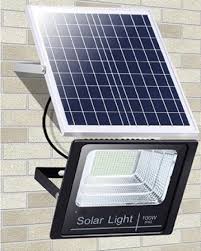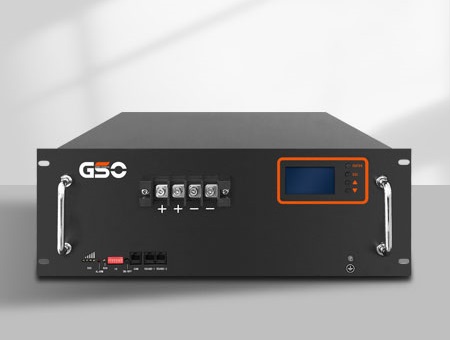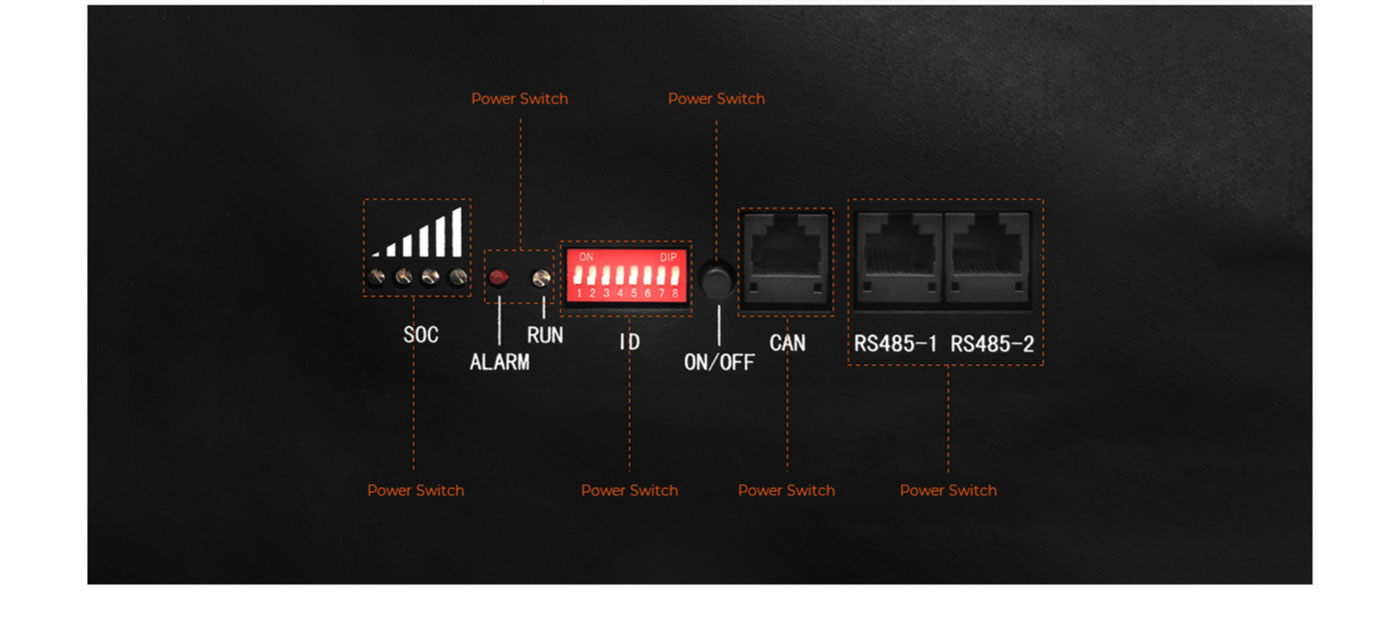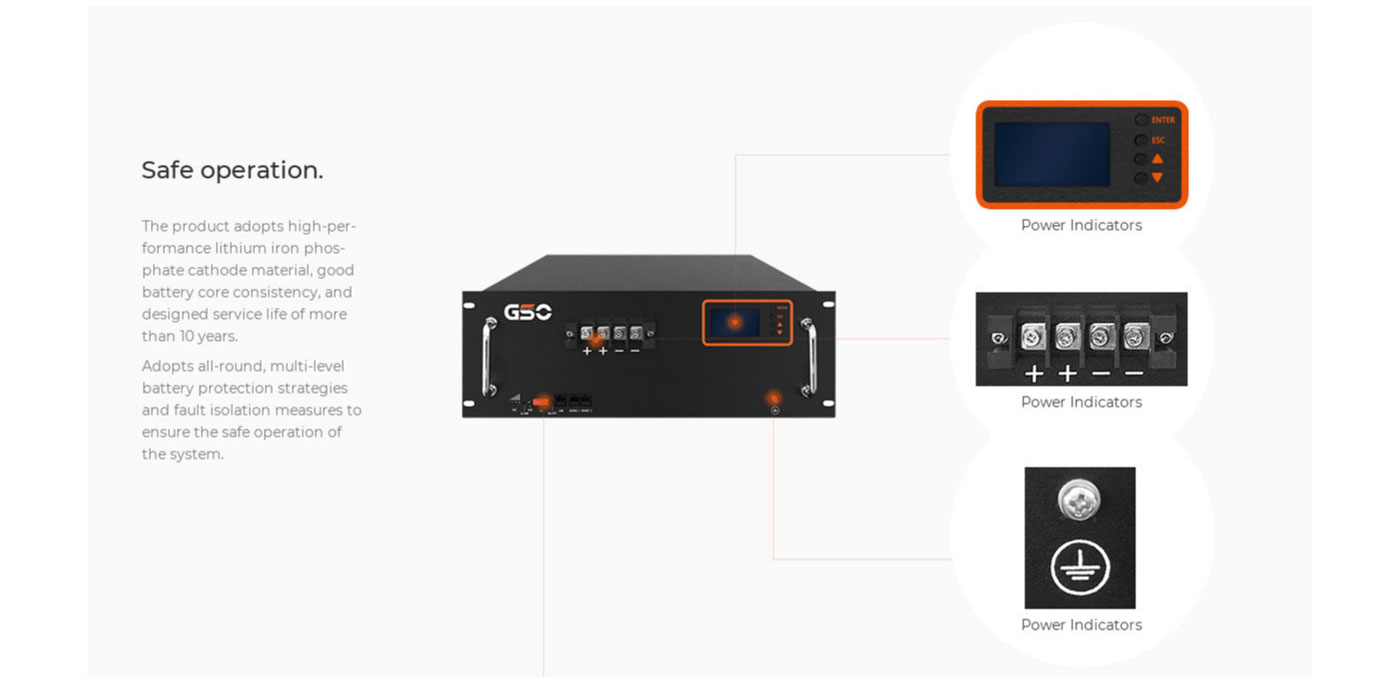|
Performance characteristics:
1.Small size and light weight.
2.Maintenance-free.
3.Environmental protection and pollution-free materials, no heavy
metals, green and environmental protection.
4.The standard cycle life exceeds 5000 times.
5.Accurately estimate the state of charge of the battery pack, that is,
the remaining power
of the battery, to ensure that the power of the
battery pack is maintained within a
reasonable range.
6.Built-in BMS management system with comprehensive protection and
monitoring and
control functions.
|
The product adopts modular design, higher integration, and saves
installation space; adopts high-performance lithium
iron phosphate
cathode material, good battery core consistency, and designed service
life of more than 10 years;
one-key switch machine, front operation,
front wiring, convenient installation Convenient maintenance and
operation;
diverse functions, over-temperature alarm protection,
over-charge and over-discharge protection, short-circuit
protection;
strong compatibility,
can be seamlessly connected with UPS, photovoltaic
power generation and other main equipment; various forms of
communication interfaces, CAN/RS485, etc.
can be based on Customized
according to customer needs to facilitate the flexible use of system
remote monitoring.
High-energy, low-power lithium battery equipment
achieves higher energy supply, lower energy consumption, and
reduces
environmental pollution; adopts all-round, multi-level battery
protection strategies and fault isolation measures
to ensure the safe
operation of the system.
|
How to choose your Lithium battery
How to choose your Lithium Battery: A Lithium battery is often
the most expensive element in a solar installation, and as a battery
is a long term investment, it is important to take into account all
aspects of a battery before buying. There are a number of parameters
that are important to consider when buying batteries, for example:
-
Voltage and capacity
-
charge / discharge rate (C-rate)
-
Depth of Discharge (DoD%)
-
Life span, warranty and (local) back-up support
-
Expandability
-
Mounting
-
other
Voltage and Capacity
The
Voltage of a battery will have to match the Voltage of your
inverter. These days, most home solar or backup installations are 48
Volts (V). The higher the voltage, the less energy losses take place
inside the system.
The
Capacity of a battery is the total amount of electricity that it can
store, measured in kilowatt-hours (kWh) or Ampere-hour (Ah). If the
battery capacity is measured in Ah, just multiply the Voltage of the
battery with the Ah rating:
Wh = Ah x V
To
calculate how long a battery will last, for your intended use, you
can multiply the loads you want to connect, by the duration you want
to run the loads for. For example, your load is 1 kW (1,000 Watts);
a battery with a useable capacity of 4 kWh will run this load for 4
hours.
Time (hours) x kW = kWh
C-rate
While capacity tells you how big your battery is, the C
rate tells you how much power a battery can provide at a given
moment, or how quickly the battery can be charged or discharged.
A battery
with a high capacity and a low C rate would deliver a low amount of
electricity (enough to run a few crucial appliances) for a long
time. A battery with low capacity and a high C rate could run your
entire home, but only for a few hours. The C-rate is relative to the
capacity of the battery, e.g.:
In
summary, 1C means that the battery is fully charged and discharged
within one hour, 2C is 30 minutes, and 0.5 C means 2 hours.
Example: a Pylontech US3000C will have a C-rate of 0.5, while some
other batteries have a 1 C-rate. To be sure that a 5 kVA / 4 kW
inverter can run at its full potential, you would need at least 3 of
these Pylontech batteries.
Also have a look at this article on C-rating
for batteries.
Depth of
discharge (DoD)
The Depth
of Discharge (DoD) of a battery refers to the amount of a battery’s
capacity that has been used. Most battery manufacturers will specify
a maximum DoD for optimal performance. For example, if a 10 kWh
battery has a maximum DoD of 90 percent, you shouldn’t use more than
9 kWh of the battery before recharging it.
In
theory, all Lithium batteries can be discharged at 100%, but this
will shorten its cycle life and might affect warranties. The stated
DoD in battery specifications should therefore always be considered
together with the life span (see below).
|
Life span, warranty and back-up support
In general, most Lithium batteries will have an expected
life-span of somewhere between 8 and 16 years. In most home solar
systems, your battery will “cycle” (charge and discharge) daily. Over
time, your battery will lose some of the charge.
This is similar to the battery in your phone – you are
charging your phone each night, and as your phone gets older, the
battery doesn’t last as long as it did when it was new. Extreme
temperatures can affect the life span of a battery. The life-span of a
battery is often stated in number of cycles, e.g. 4,000 cycles.
Your battery will have a warranty that guarantees a
certain number of cycles and/or years of useful life, often for a
certain maximum DoD. Warranty often states for example “10 years at a
maximum (or average) DoD of 80%”, and that after 10 years “60% of the
battery’s capacity” will remain. Always try to check for this statement
in a battery’s specification, the DoD in combination with life span and
remaining capacity.
Another aspect to consider is back-up support, and
whether this support can be provided locally as well. For example, if a
battery is assembled locally, and there is a specific battery cell that
happens to be faulty, the manufacturer can come and simply swap out that
cell. However, for many imported batteries, the unit has to be sent back
to its origin for repairs, and you might have to wait for a long time to
get your battery back once it is repaired.
Expandability
Most batteries are designed to be “expandable,” which
means that you can add multiple batteries to your solar system to get
extra capacity. Check for this option to make sure you can expand your
system in the future.
Battery mounting and racks
Some batteries can be wall-mounted, others have to be
placed on the ground, and sometimes you need to buy specific cabinets.
If, for example, you have limited space in your garage next to the DB
board, the mounting system is something to consider as well.
Other considerations
Other aspects to consider are, whether you need extra
specific battery cables, whether the battery is compatible with your
brand of inverter and whether the battery is able to communicate with
the inverter, and last but not least of course the what the total price
is, compared to the quality of the battery. Price per kWh would be
useful for comparison, taking into account, warranty, number of cycles
etc; in short considering all the issues discussed above.

Solar
security light with Lithium battery
or quote please send us email:
icm@lantic.net we do not accept your e
mail over the phone.
Order form, Proforma invoice
ICM Industries
Midrand South Africa
Tel:011- 312 33 93
Direction:
On Google Map you can search for ICM
Industries.
|






